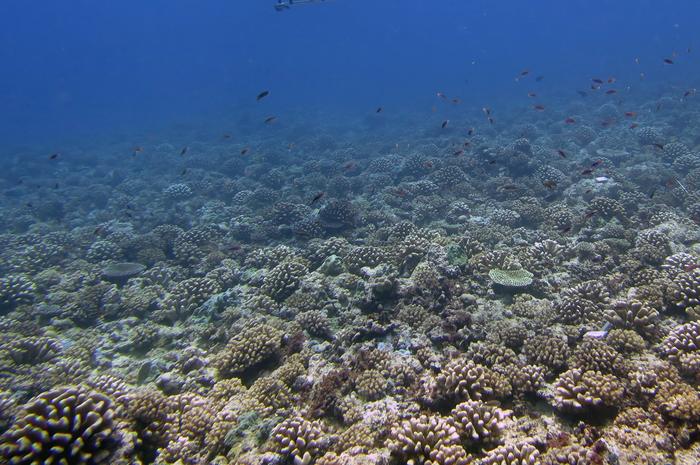Recent findings have underscored the incredible biochemical complexity of coral reefs, revealing that an astonishing array of chemicals emitted by tropical corals and seaweeds are available for microbial communities to decompose and utilize. This groundbreaking research, led by an international team from the Scripps Institution of Oceanography and the University of Hawai‘i at Mānoa, emphasizes the essential role these relationships play in the intricate balance of marine ecosystems and the global carbon cycle. The study was detailed in the journal Environmental Microbiology, which highlights the pivotal role that these microscopic organisms play in the health and sustainability of coral reef systems.
Coral reefs, often described as the “rainforests of the sea,” not only serve as a habitat for countless marine species but also significantly influence the Earth’s carbon dynamics. In nutrient-poor environments, such as those inhabited by coral reefs, every molecule produced becomes a potential resource, inevitably drawing in an array of microbial life that thrives on organic compounds. Craig Nelson, a distinguished professor at UH Mānoa, elaborates on this dynamic, pointing out that the substances known as exometabolites play an invaluable role in shaping microbial metabolism and, by extension, the overall health of the reef ecosystem.
One of the breakthroughs of this research was the discovery of a remarkable diversity of exometabolites available to microbes. Scientists had previously identified a limited range of compounds; however, the current study reveals that hundreds of diverse chemical families, previously thought to be resistant to microbial degradation, are in fact metabolized by these organisms. Lead author Zachary Quinlan emphasizes the significance of these findings, especially concerning compounds with complex structures, such as terpenoids and steroid derivatives, which challenge the traditional understanding of microbial substrate utilization.
The study emphasizes how the chemical exchange between coral reefs and microorganisms goes beyond mere sustenance. It enhances our understanding of the metabolic pathways that govern these interactions, particularly in relation to how organic materials are processed within marine ecosystems. The intricate relationships drive not only nutrient cycling but also establish the foundation for resilience against environmental shifts. Indeed, changes in reef chemistry can be observed when there is a transition from coral-dominated to algae-dominated systems.
Most critically, this research outlines a compelling narrative regarding the implications of these interactions for global carbon cycling. Marine organic matter, including the chemicals released by coral reefs, contains significant carbon reserves—approximately equal in volume to the atmospheric carbon dioxide. The quantification and understanding of microbial utilization of these substances could prove vital in addressing global climate change, as it highlights the interconnectedness of marine ecosystems and atmospheric conditions.
As the study delves deeper, it also scrutinizes how different microbial communities respond to varying substrates. Coral and algae can modulate these communities by exuding unique chemicals that preferentially nurture specific microbial populations. Linda Wegley Kelly, a senior author of the study, articulates the consequences of these shifts, noting that a transition from a coral-dominated reef to one dominated by algae could have deleterious effects on microbial diversity and ecosystem functionality, potentially increasing vulnerability to diseases and bleaching events.
Such multifunctional roles of exometabolites are critical as researchers look toward coral management and restoration strategies. The present study sets a foundation for future research, wherein an understanding of chemical characteristics could shape interventions aimed at preserving coral reef ecosystems resilient to climate change.
In summary, this research significantly enriches our understanding of microbial dynamics within coral reef environments, highlighting the complex web of interactions between these organisms and their chemical outputs. It offers a new perspective on the role of marine organisms in modulating ecological processes that impact both local biodiversity and larger atmospheric dynamics. The findings not only advance scientific knowledge but also reinforce the urgent need for conservation efforts to sustain coral reef systems worldwide.
The ongoing exploration into the chemical underpinnings that support coral reef ecosystems underscores the intricate connections underpinning marine biodiversity. It reinforces the notion that understanding the molecular and biochemical signatures present in these habitats is crucial to developing effective conservation strategies. As the field progresses, the insights gained from this research could be instrumental in guiding policies aimed at coral restoration and management, ultimately contributing to the health and sustainability of these vital ecosystems.
Scientists continue to push the frontiers of knowledge about marine environments. The in-depth research into coral reef exometabolomes exemplifies the lucidity with which modern science can illuminate the intricate relationships governing our planet’s ecosystems. The broader implications of these findings reach far beyond local environments, resonating within conversations surrounding climate change mitigation and biodiversity conservation on a global scale.
With the world facing unprecedented environmental challenges, studies like this remind us of the critical role that all organisms—especially microorganisms—play in maintaining the delicate balance of life on Earth. As technology advances, the potential for subsequent discoveries remains vast, paving the way for a deeper understanding of ecological relationships and their impact on the health of our oceans.
Subject of Research: Cells
Article Title: Microbial Community Metabolism of Coral Reef Exometabolomes Broadens the Chemodiversity of Labile Dissolved Organic Matter
News Publication Date: 19-Mar-2025
Web References: https://enviromicro-journals.onlinelibrary.wiley.com/doi/10.1111/1462-2920.70064
References: 10.1111/1462-2920.70064
Image Credits: Credit: Beverly French
Keywords: Coral reefs, exometabolites, microbial communities, carbon cycle, marine ecosystems, environmental microbiology, coral reef management, marine biology.




